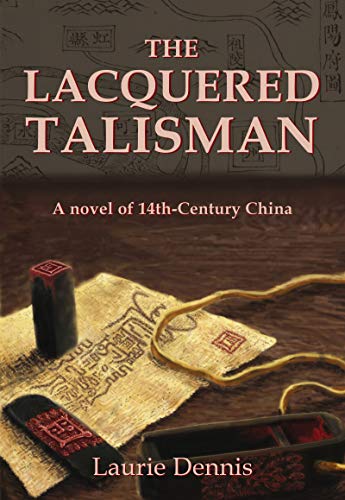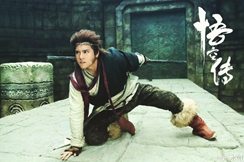
The Lacquered Talisman received a 4+ star review, making it an IndieReader Approved title.
Following find an interview with author Laurie Dennis.
What is the name of the book and when was it published?
The Lacquered Talisman was scheduled to be printed in China on February 1, 2020, but that’s when everything shut down there due to COVID19, so actual printing did not start until March, just in time for everything to shut down here in the U.S., where I am based. I did not expect publication of my first novel to be so dramatic. Ironically, my main character spends much of the book dealing with the epidemic of his era: the plague.
What’s the book’s first line?
The ruling Mongols assigned the Zhu clan from Jurong County, south of the Yangtze River, to be a gold-panning household.
What’s the book about? Give us the “pitch”.
A sweeping coming-of-age epic, The Lacquered Talisman launches the story of one of the most influential figures in Chinese history. He is the son of a bean curd seller, a survivor of the pox and the plague, and he will found the Ming Dynasty, which ruled China from 1368-1644.
What inspired you to write the book? A particular person? An event?
The story of the Ming founding in the early 1300s is a particularly exciting tale, and well-known in Chinese. It’s been chronicled and fictionalized almost since the events happened, and continues to be told through television shows, operas, comic books, songs, poems, and historical fiction. However, this story is almost unknown in the English language. I decided that, after 600-plus years, I’d have to write this story myself if I wanted to see it in English!
What’s the main reason someone should really read this book?
Here’s a chance to look past all the negative headlines about U.S.-China relations and discover one of the great stories from Chinese history.
What’s the most distinctive thing about the main character? Who-real or fictional-would you say the character reminds you of?
No one can compare to Zhu Yuanzhang, my main character. And most English speakers can’t pronounce his name – so I refer to him as “Fortune,” among other things. He is the only peasant to become an emperor in China’s long, long dynastic history. His story tells itself – I just tried to keep up with his many adventures!
If they made your book into a movie, who would you like to see play the main character(s)?
The Taiwanese-Canadian actor Eddie Peng. He’s too handsome to be Zhu Yuanzhang, but he does have the required sharp chin. (The photo is of him starring as the Monkey King in a 2017 film, Wu Kong.)
When did you first decide to become an author?
I worked as a journalist for many years, and so have been published in newspapers and magazines, but I’d always wanted to write a novel. It was just a matter of what story to focus on. And finding time to write it all out.
Is this the first book you’ve written?
The Lacquered Talisman is my debut, and is planned as the first in a series on the Ming founding. This one took me about 15 years because I had to spend so much time translating classical Chinese texts. Book 2 is thankfully not going to need that kind of time – it’s already almost done.
What do you do for work when you’re not writing?
I work on programs about China and East Asia, and also on academic partnerships with Chinese institutions, at my alma mater, the University of Wisconsin-Madison. Go Badgers!
How much time do you generally spend on your writing?
I try to spend 2-3 hours every day on research and writing. I go through extensive re-writes, and also work with a writer’s group that meets quarterly – this is an essential part of the process because it’s a way to be inspired by other writers and also be held to deadlines for submitting copy.
What’s a great piece of advice that you can share with fellow indie authors?
A wise fellow writer told me early on that, “You have to try a lot of things.” Twitter, Instagram, YouTube, book talks, blog posts – to reach readers, you have to invest time in as many outlets as possible. This can be hard for those who, like me, might be happiest immersed in the interior world of writing. But promotion is the only way to get the word out on the story you’ve spent so much time telling.

